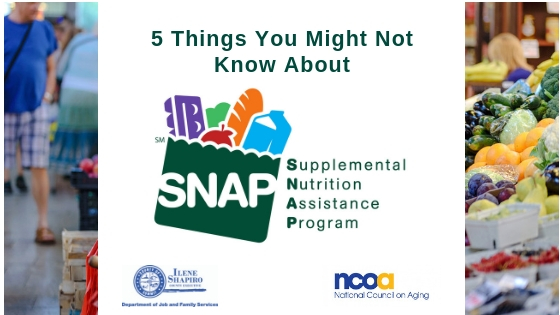The Supplemental Nutrition Assistance Program (SNAP) is the nation’s largest federal nutrition program. SNAP benefits help low-income individuals and families. SNAP aims to improve food security and nutrition among low-income households.
Are you sure you understand all you need to know about the senior Supplemental Nutrition Assistance Program? If not, here are five things you might not know about senior SNAP benefits.
SNAP is not a charity
SNAP benefits are not available because of donations or a charitable cause. Like Social Security and Medicare, you pay into it so that the money is there when you need it.
There are more than enough SNAP benefits for eligible people. Enrolling in SNAP never means taking SNAP benefits away from someone else.
The Supplemental Nutrition Assistance Program is actually under-enrolled. Only two out of five seniors who are eligible for SNAP food assistance benefits are enrolled in SNAP. That means three out of five seniors are not receiving SNAP benefits even though they are eligible. Make sure you do not miss out by checking your eligibility.
You cannot buy certain items with SNAP
Not all items are eligible for the SNAP program. Even if a store accepts SNAP, there are items within the store that you cannot buy with your SNAP benefits.
Here are things you cannot purchase with SNAP:
- Alcohol
- Tobacco
- Prepared hot foods or meals “to-go” that will be eaten immediately
- Non-food items
SNAP no longer distributes food-stamp coupons
In the past, you had to use food-stamp coupons to purchase items with SNAP benefits. Some individuals who used food-stamps might have felt embarrassed or inconvenienced by having to use the coupons.
The Supplemental Nutrition Assistance Program resolved this issue by getting rid of the coupon system. Instead, your food assistance benefits are loaded onto a debit card.
The Ohio Electronic Benefits Transfer (EBT) system has replaced food-stamp coupons with the Ohio Direction Card. The electronic debit card is safe because no one can use it without your four-digit PIN. The card is discrete and convenient for shopping in stores that accept SNAP.
SNAP is meant to supplement nutrition, not cover all associated costs
The Supplemental Nutrition Assistance Program is just as it says in the name – supplemental. It is meant to be an extra resource to help you get sufficient nutrition. You should not rely on SNAP to cover all of your food-related costs.
If you receive SNAP benefits and still cannot purchase an adequate amount of food, you may be eligible for other food assistance programs. Contact the Summit County Department of Job and Family Services or Direction Home Area Agency on Aging and Disabilities to learn more about the resources you may be eligible for.
The National Council on Aging has resources on SNAP
The National Council on Aging (NCOA) is a respected national leader and trusted partner to help people age 60 and older meet the challenges of aging. It partners with nonprofit organizations, governmental agencies, and businesses to provide innovative community programs and services, online help, and advocacy.
You can use the NCOA’s website as a tool to help you better understand SNAP benefits. Here are just a few resources to get you started:
- Infographic: Seniors & SNAP: 5 Myths Busted
- SNAP for Seniors: Establishing Eligibility and Maximizing Benefits
- Strategies to Simplify SNAP for Seniors
The National Council on Aging also supports SNAP education in communities. For example, the NCOA has funded events across Summit County for seniors to learn more about SNAP benefits from the experts at Summit County Department of Job and Family Services in partnership with VANTAGE Aging. Check VANTAGE’s event page to see upcoming events.
Don’t miss out on benefits that you could be receiving. Apply for SNAP today at benefits.ohio.gov or call 844-640-6446 to find out if you are eligible.
Check in with VANTAGE Aging for the next Seniors, Sandwiches & SNAP event in Summit County for an information session from Summit County Department of Job and Family Services over a free lunch. Funded by Summit County Department of Job and Family Services.
*The information in this article is intended solely to provide general information on matters of interest for the personal use of the reader, who accepts full responsibility for its use. This article should not be used as a substitute for consultation with professional legal, medical, or other competent advisors.

